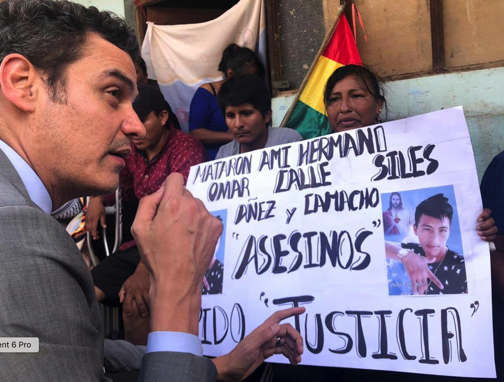
(above) Executive Secretary for the Inter-American Commission on Human Rights of the Organization of American States (IACHR/OAS) Paulo Abrao meets relatives of demonstrators who died during clashes with security forces, in Sacaba, outskirts of Cochabamba, Bolivia, November 25, 2019. The sign reads "They killed my brother Omar Calle Siles, Anez and Camacho murderers, I demand justice”. REUTERS/Mitra Taj
Human rights violations in Bolivia merit outside probe: Americas commission head
November 26, 2019 - Original article: Reuters
by Mitra Taj
COCHABAMBA, Bolivia (Reuters) - Bolivia may need outside help to investigate a “massive” number of human rights violations amid post-election violence to ensure findings are seen as credible in the deeply divided country, the head of a regional human rights commission told Reuters on Tuesday.
After a three-day visit to Bolivia, Paulo Abrão, who heads the Inter-American Commission on Human Rights (IACHR), recommended Bolivia coordinate with an international panel of experts similar to one formed to investigate the disappearance of 43 students in Mexico.
“Normally in these situations ... national institutions aren’t prepared to resolve such a massive grouping of violations” of human rights, Abrão said in an interview in Cochabamba, a region hard hit by the violence.
Bolivia spiraled into chaos after its Oct. 20 election was mired in controversy amid allegations it had been rigged in favor of former socialist President Evo Morales, who resigned under pressure from security forces and protesters.
Most of the at least 33 fatalities since the vote occurred after the military deployed against Morales’ backers as they blocked strategic roads to protest what they viewed as a coup.
President Jeanine Áñez, a rightwing former Senator, took office on Nov. 12 as the most senior elected official in a power vacuum.
Áñez’ government and backers of Morales, despite hostilities, have managed to reach a series of deals to pave the way for new elections, to end protests and to withdraw troops from the streets, a step Abrão praised as key to preventing more rights violations.
It was unclear when new elections might be held. The first appointee to the incoming electoral board has said it was technically impossible to organize them by Jan. 22, when the current executive and legislative terms end.
A lawmaker in Áñez’ party said it could take four to five months, likely meaning she will be in office for at least six.
On Tuesday, her foreign minister nominated an ambassador to the United States for the first time since 2008, when diplomatic relations with Washington soured under Morales. The appointment must be approved by Congress, which Morales’ party Movement to Socialism (MAS) controls.
MAS has not yet announced possible election candidates. The runner-up in the now-anulled October vote, Carlos Mesa of the Citizen Community Party, has confirmed he will run again.
Rightwing Antonio Camacho, who overshadowed Mesa in pressuring Morales to resign, said he would run on a ticket with fellow civic leader Marco Pumari, without saying who would be the candidate for the top job.
In Cochabamba, Abrão said he received rival accounts from authorities and civilians of how people died in recent unrest and said his team would report its conclusions in coming weeks.
IAHR is part of the Organization of American States (OAS), which found serious irregularities in an audit of the election that led to Morales’ downfall.
Abrão was welcomed by thousands of people chanting “justice!” during his visit to the nearby town of Sacaba, where nine people were shot dead in demonstrations against Áñez.
Abrão heard descriptions of security forces using live ammunition to suppress what people said had been a peaceful protest.
“My brother Julio Pinto is in intensive therapy,” Felix Pinto, an indigenous farmer told Abrão and his team. “It’s as if he’s dead right now.”
Áñez’ government denies security forces are to blame for the deaths, and the attorney general has said bullets found are not a type issued to the military or police.
Reporting By Mitra Taj; Editing by Bill Berkrot and Grant McCool